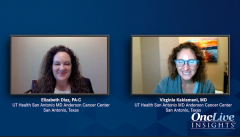
Remaining Unmet Needs for Patients With HR+/HER2- mBC
Experts highlight some remaining unmet needs in the treatment and management of patients with HR+/HER2- metastatic breast cancer.
Episodes in this series

Virginia Kaklamani, MD: Moving on to the future, I have a few questions for both of us. I'll ask you first, Elizabeth, and then I'll go second. What are the remaining unmet needs for patients with HER2-positive but ER-negative metastatic breast cancer?
Elizabeth Diaz, PA-C: Indeed, there are so many unmet needs. For instance, in Massachusetts, where I was involved, we looked at HER2-positive patients with brain metastases and observed some promising outcomes. However, for those who are HER2-negative, the results were stable but didn't necessarily outperform chemotherapy. There's a clear unmet need for more agents that are effective against brain metastases. The ongoing Denver trial might provide some insights. Then there's the challenge of sequencing drugs, especially in a second-line setting. It can be overwhelming to sift through complex guidelines and algorithms, and it can be a real puzzle deciding on the next step.
Virginia Kaklamani, MD: I understand your concerns, Elizabeth. From my side, one of the significant challenges is overcoming endocrine resistance. It's still a hurdle determining the right approach for patients after their tumors progress on CDK 4/6 inhibitors. Using endocrine therapy alone usually results in a progression-free survival of roughly 3 to 4 months. And while combining treatments offers a different approach, it's not without its challenges, such as diarrhea and elevated blood sugar levels from certain medications. Upcoming agents also present issues like diarrhea, even though they are essential in delaying chemotherapy. Another topic gaining traction is the HER2 ultra-low category. These are patients with some HER2 staining, albeit minimal. Ongoing research is trying to pinpoint the best treatments for this group. Preliminary data show some benefits, though perhaps not as robust as in HER2-positive cases. Looking ahead, the introduction of new antibody-drug conjugates and other targeted therapies offers hope, potentially granting us more options for these patients.








































